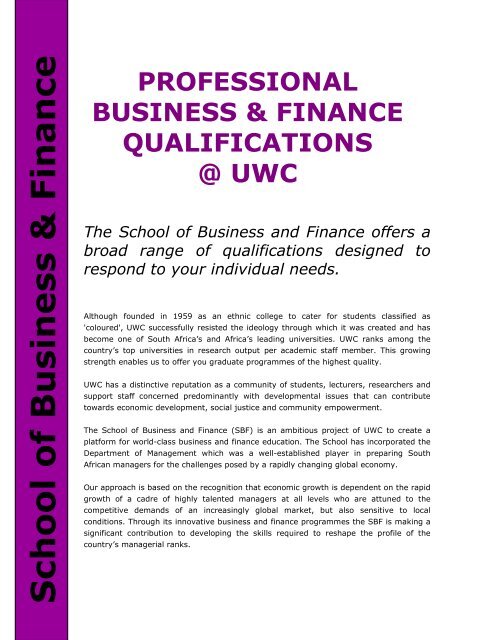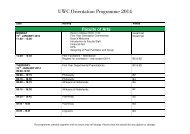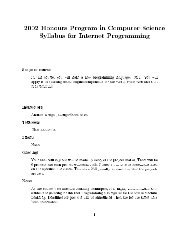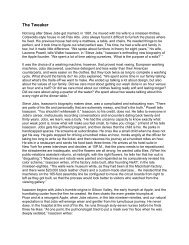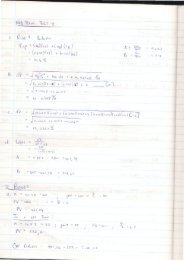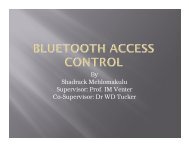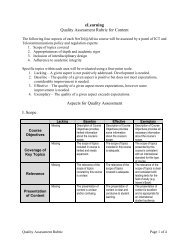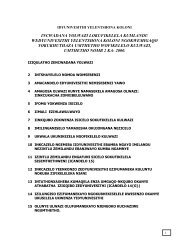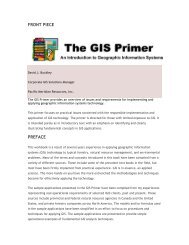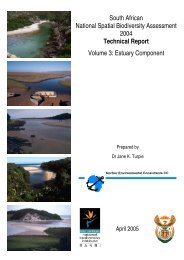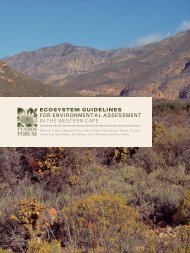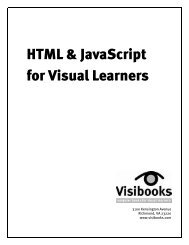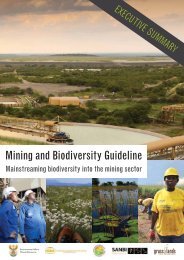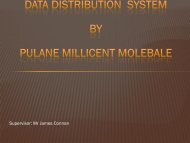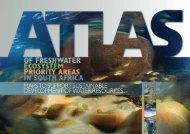Brochure - University of the Western Cape
Brochure - University of the Western Cape
Brochure - University of the Western Cape
You also want an ePaper? Increase the reach of your titles
YUMPU automatically turns print PDFs into web optimized ePapers that Google loves.
School <strong>of</strong> Business & Finance<br />
PROFESSIONAL<br />
BUSINESS & FINANCE<br />
QUALIFICATIONS<br />
@ UWC<br />
The School <strong>of</strong> Business and Finance <strong>of</strong>fers a<br />
broad range <strong>of</strong> qualifications designed to<br />
respond to your individual needs.<br />
Although founded in 1959 as an ethnic college to cater for students classified as<br />
'coloured', UWC successfully resisted <strong>the</strong> ideology through which it was created and has<br />
become one <strong>of</strong> South Africa’s and Africa’s leading universities. UWC ranks among <strong>the</strong><br />
country’s top universities in research output per academic staff member. This growing<br />
strength enables us to <strong>of</strong>fer you graduate programmes <strong>of</strong> <strong>the</strong> highest quality.<br />
UWC has a distinctive reputation as a community <strong>of</strong> students, lecturers, researchers and<br />
support staff concerned predominantly with developmental issues that can contribute<br />
towards economic development, social justice and community empowerment.<br />
The School <strong>of</strong> Business and Finance (SBF) is an ambitious project <strong>of</strong> UWC to create a<br />
platform for world-class business and finance education. The School has incorporated <strong>the</strong><br />
Department <strong>of</strong> Management which was a well-established player in preparing South<br />
African managers for <strong>the</strong> challenges posed by a rapidly changing global economy.<br />
Our approach is based on <strong>the</strong> recognition that economic growth is dependent on <strong>the</strong> rapid<br />
growth <strong>of</strong> a cadre <strong>of</strong> highly talented managers at all levels who are attuned to <strong>the</strong><br />
competitive demands <strong>of</strong> an increasingly global market, but also sensitive to local<br />
conditions. Through its innovative business and finance programmes <strong>the</strong> SBF is making a<br />
significant contribution to developing <strong>the</strong> skills required to reshape <strong>the</strong> pr<strong>of</strong>ile <strong>of</strong> <strong>the</strong><br />
country’s managerial ranks.
2<br />
Our programmes are designed to enable students to enhance <strong>the</strong>ir careers and make an<br />
invaluable contribution to develop <strong>the</strong> leadership cadre required to drive economic<br />
development.<br />
Our academic programmes recognise that experienced managers and graduates from diverse<br />
disciplines are keen to develop <strong>the</strong> pr<strong>of</strong>essional skills required to succeed as managers and<br />
leaders. We recognise that prior educational choices and limited access to tertiary education<br />
may have limited you from exploiting changing career prospects in management in <strong>the</strong> private<br />
and public sectors.<br />
We are continually introducing new pr<strong>of</strong>essional qualifications and that are tailored to cater for<br />
students with different interests and diverse academic and employment backgrounds. From<br />
2009 we will introduce an Advanced Diploma in Management for those pursuing a Financial<br />
Planning career.<br />
We <strong>of</strong>fer three options for <strong>the</strong> Masters in Management<br />
• Block-week coursework plus research project or report<br />
• Block-week coursework plus mini-<strong>the</strong>sis<br />
• Masters by dissertation<br />
Three options are <strong>of</strong>fered in <strong>the</strong> B.Com.(Honours) degree:<br />
• Business Administration, including Employment Relations<br />
• Management<br />
• Finance/Investments<br />
Four options are <strong>of</strong>fered in <strong>the</strong> Advanced Diploma in Management (ADM):<br />
• General Management<br />
• Finance<br />
• Financial Planning<br />
• Post-graduate<br />
The Management Development Programmes (MDP) is <strong>of</strong>fered in two phases:<br />
• MDP (one year part-time)<br />
• Senior MDP (Second year part-time)<br />
The framework <strong>of</strong> our qualifications is underpinned by a modular structure, coupled with<br />
principles <strong>of</strong> career-long learning and flexible entry and exit points. Our qualifications are<br />
unique because <strong>of</strong> how <strong>the</strong>y fit in with <strong>the</strong> thinking <strong>of</strong> <strong>the</strong> National Qualifications Framework.<br />
MDP and ADM students who perform exceptionally in <strong>the</strong> first half <strong>of</strong> <strong>the</strong> curriculum may be<br />
admitted to <strong>the</strong> ADM or Honours degree and can accelerate <strong>the</strong>ir progress by transfering up to<br />
half <strong>of</strong> <strong>the</strong>ir credits to <strong>the</strong> higher qualification.
OUR PHILOSOPHY<br />
The <strong>University</strong>'s mission - “a place <strong>of</strong> quality, a place to grow, from hope to action<br />
through knowledge” -- reflects our emphasis on high quality graduate business<br />
and finance programmes.<br />
Our admission requirements are flexible because we not only recognise<br />
your tertiary education but also value <strong>the</strong> skills and competencies learned<br />
through meaningful and relevant work experience.<br />
We welcome all students who can demonstrate management and<br />
leadership potential after acquiring one <strong>of</strong> our pr<strong>of</strong>essional qualifications because<br />
numerous highly competent people from diverse educational backgrounds have<br />
<strong>of</strong>ten been unable to access tertiary education.<br />
Despite our flexible admission criteria we expect <strong>the</strong> highest standards <strong>of</strong><br />
our graduates to ensure that our qualifications are highly regarded in <strong>the</strong><br />
marketplace.<br />
A modular structure, coupled with principles <strong>of</strong> career-long learning,<br />
underpins our programme structure. Our qualification structure enables students<br />
to transfer credits from short SAQA-accredited courses to a post-graduate<br />
qualification.<br />
OUR VALUES<br />
The School <strong>of</strong> Business and Finance is fully committed to <strong>the</strong> values <strong>of</strong><br />
<strong>the</strong> Faculty <strong>of</strong> Economic and Management Sciences:<br />
• equal access to education<br />
• community involvement and partnership<br />
• concern for local, national and global issues<br />
• lifelong learning to enhance <strong>the</strong> quality <strong>of</strong> life and <strong>the</strong><br />
development <strong>of</strong> people<br />
• programmes based on research-generated knowledge<br />
• participation and co-determination<br />
• equal opportunities for employment and advancement in society<br />
3
MASTERS IN MANAGEMENT<br />
The block-week format provides experienced<br />
managers with <strong>the</strong> unique opportunity to combine a<br />
busy work schedule with advanced study in General<br />
Management.<br />
Career success at <strong>the</strong> highest levels in management demands <strong>the</strong> development <strong>of</strong> a broad<br />
range <strong>of</strong> general management competencies and a comprehensive understanding <strong>of</strong><br />
managerial dynamics. The Masters in Management provides an opportunity to understand<br />
contemporary economic, business and social challenges and to develop <strong>the</strong> intellectual skills<br />
required to take <strong>the</strong> lead at <strong>the</strong> highest managerial levels in your chosen field.<br />
Admission to <strong>the</strong> Masters in Management is restricted to graduates who hold a four-year or<br />
honours degree majoring in Management or an Advanced (or Post-graduate) Diploma in<br />
Management. Applicants for <strong>the</strong> block-week course-work options are normally expected to<br />
have at least three years work experience after graduation, including managerial experience,<br />
so that <strong>the</strong>y can contribute to class discussion and benefit fully from <strong>the</strong> focus <strong>of</strong> <strong>the</strong><br />
programme on developing general management competencies.<br />
Three masters options are available:<br />
4<br />
• BLOCK-WEEK COURSE-WORK plus RESEARCH REPORT (45 credits) is particularly<br />
suited to experienced managers who are pursuing a pr<strong>of</strong>essional management career.<br />
This degree <strong>of</strong>fers a specialisation in general management.<br />
• BLOCK-WEEK COURSE-WORK plus MINI-THESIS (90 credits) is particularly suited<br />
to those interested in developing in-depth research capabilities appropriate for a career<br />
in academia or research in business management.<br />
• FULL THESIS is suitable for students who already have a strong academic background<br />
in Management (e.g. an MBA) and wish to pursue an academic or research career.<br />
Applicants are required to submit a draft proposal in consultation with a designated<br />
supervisor before <strong>the</strong>ir application for admission will be considered by <strong>the</strong> School.<br />
Fur<strong>the</strong>r details about this option can be obtained from <strong>the</strong> School.<br />
The Course-work Masters in Management has two main components:<br />
• Modules in general management develop a strong analytical foundation for aspirant<br />
senior managers and executives<br />
• Research methods modules and a research project develop in-depth research<br />
competencies.<br />
Each semester comprises two full-time blocks <strong>of</strong> one week duration. 1 st year blocks will<br />
typically be scheduled in <strong>the</strong> 5 th and 12 th weeks <strong>of</strong> <strong>the</strong> semester with 2 nd year blocks scheduled<br />
in <strong>the</strong> 6 th and 13 th weeks <strong>of</strong> each semester.
In line with <strong>the</strong> <strong>University</strong>’s policy on continuous assessment, students are expected to<br />
complete assignments prior to, during and after each full-time block and also write an<br />
examination for each module. Students should ensure that <strong>the</strong>ir personal circumstances allow<br />
<strong>the</strong>m to dedicate at least 12 hours per week to <strong>the</strong>ir studies throughout <strong>the</strong> year while not<br />
attending <strong>the</strong> full-time blocks.<br />
Research is required for all South African master’s degrees and we have developed a thorough<br />
process to enable students to develop <strong>the</strong>ir research competences. Prior to registration<br />
students are expected to identify a research topic before registration and immediately begin to<br />
work on <strong>the</strong>ir research proposal in consultation with <strong>the</strong>ir supervisor. The proposal is drafted<br />
during <strong>the</strong> Analytical and Critical Thinking module and should be finalized during <strong>the</strong> Business<br />
Research Methods module.<br />
During <strong>the</strong> third year <strong>of</strong> enrolment students will complete <strong>the</strong> Research Report or Mini-<strong>the</strong>sis<br />
and will be required to present detailed progress reports and draft chapters <strong>of</strong> <strong>the</strong>ir<br />
dissertation to <strong>the</strong> quarterly Management Research Seminar. The mini-<strong>the</strong>sis option is<br />
restricted to students whose proposal is approved during Business Research Methods or before<br />
<strong>the</strong> end <strong>of</strong> <strong>the</strong> second year (part-time) or first year (full-time).<br />
Structure and Schedule<br />
The programme is designed to extend over three-years <strong>of</strong> part-time study. Students must<br />
attend a one-week full-time block each term (4 annually) over <strong>the</strong> first two years and four<br />
quarterly research seminars in <strong>the</strong>ir third year <strong>of</strong> enrolment. Part-time students will enroll for<br />
two modules per semester. In <strong>the</strong> first three semesters <strong>the</strong> curriculum is prescribed. In <strong>the</strong><br />
fourth semester a number <strong>of</strong> electives will be <strong>of</strong>fered subject to student demand and staff<br />
availability.<br />
SCHEDULE<br />
Semester 1 (Blocks 1 & 2)<br />
Organisational Diagnosis<br />
SA Business and Globalisation<br />
Analytical and Critical Thinking<br />
Semester 2 (Blocks 3 & 4)<br />
Analytical and Critical Thinking continues<br />
Ethics and Leadership<br />
Semester 3 (Blocks 5 & 6)<br />
Business Research Methods<br />
Business and <strong>the</strong> Political Economy<br />
Semesters 5 & 6 (Quarterly seminars)<br />
Research Report or Mini-Thesis<br />
Management Research Seminar (meets quarterly)<br />
Semester 4 (Blocks 7 & 8)<br />
2 electives, selected from:<br />
Advanced Marketing Seminar<br />
Advanced Operations Seminar<br />
Advanced Strategic Management<br />
Comparative Organisation & Management<br />
Corporate Governance<br />
Managing Organisational Transformation<br />
Social Entrepreneurship<br />
Strategic Human Resource Issues<br />
Work Organisation<br />
5
B.COM.(HONOURS) IN BUSINESS<br />
ADMINISTRATION<br />
There are no short cuts to a pr<strong>of</strong>essional business<br />
education. The B. Com.(Honours) is very rewarding<br />
but also very demanding<br />
The B. Com (Honours) in Business Administration is designed for pr<strong>of</strong>essionals who hold,<br />
or are working towards, middle to senior management positions. The programme is specifically<br />
developed for <strong>the</strong> following individuals who do not have an undergraduate degree majoring in<br />
management but wish to develop <strong>the</strong>ir managerial potential:<br />
6<br />
• Recent Graduates with a strong bachelors academic record in any field.<br />
• Employed Graduates and holders <strong>of</strong> National Diplomas, especially women who<br />
seek to make <strong>the</strong> transition to a field historically dominated by men.<br />
• Experienced Managers and Entrepreneurs who do not have a formal tertiary<br />
qualification, but have extensive practical experience, including some at managerial<br />
level.<br />
The B.Com.(Honours) degree is a rigorous academic programme, with an emphasis on<br />
quantitative skills, that aims to produce skilled managers with a broad understanding <strong>of</strong> <strong>the</strong><br />
functional areas <strong>of</strong> business. You will receive intensive and extensive exposure to progressive<br />
management <strong>the</strong>ories and practical skills that will enable you to assume positions <strong>of</strong><br />
organisational responsibility and take advantage <strong>of</strong> management opportunities in <strong>the</strong> private<br />
and public sectors.<br />
The normal part-time course load is two modules per semester for six semesters (three years)<br />
while full-time students typically take four modules per semester for three semesters.<br />
Students are expected to spend three hours per week in <strong>the</strong> classroom and ano<strong>the</strong>r seven<br />
hours studying at home for each module. Part-time students are thus expected to dedicate 20<br />
hours per week to <strong>the</strong>ir studies.<br />
Structure<br />
Core Modules. The first part <strong>of</strong> <strong>the</strong> degree consists <strong>of</strong> nine core modules which provide all<br />
students with a broad background in <strong>the</strong> major functional areas <strong>of</strong> management and <strong>the</strong><br />
quantitative and analytical techniques and competencies essential for managerial decision-<br />
making.
Electives. In <strong>the</strong> second part <strong>of</strong> <strong>the</strong> degree, students select three electives from <strong>the</strong> Business<br />
Administration stream or <strong>the</strong> Employment Relations stream. Business Administration students<br />
may choose electives in a single area such as Enterprise Management, Marketing or Finance or<br />
choose electives from a number <strong>of</strong> fields from <strong>the</strong> options in <strong>the</strong> table below.<br />
Core Modules<br />
1 ST Year Part-time 2 nd Year Part-time<br />
• Principles <strong>of</strong> Management & Business<br />
• Quantitative Analysis<br />
• Information Systems & Technology<br />
• Financial Management<br />
3 rd year Part-time<br />
• Strategic Management<br />
Electives (Not all modules are <strong>of</strong>fered every year)<br />
• Marketing Organisation & Management<br />
• Economics for Managers<br />
• Operations Management<br />
• Employee Management<br />
General Management Finance & Investments<br />
• Analytical and Critical Thinking<br />
• Contemporary Management Topics (Corporate<br />
Governance and Ethics)<br />
• Field Study<br />
• Management Information Systems<br />
• Project Management<br />
Research Methodology<br />
• Strategy and Global Competition<br />
• Technical Report<br />
• Advanced Financial Management<br />
• Advanced Management Accounting<br />
• Financial Accounting 1 & 2<br />
• Financial Analysis<br />
• Finance Seminar – Currency Risk<br />
• Investment Analysis<br />
• Investment Management<br />
• Macro-Economics<br />
• Quantitative Management Topics<br />
• Statistics for Investments<br />
Enterprise Management Financial Planning & Insurance<br />
• Business Law for SMEs<br />
• Entrepreneurship & Enterprise<br />
Development<br />
• Export and Global Markets<br />
• Finance for Growing Enterprises<br />
• Strategic Linkages for SMEs<br />
Employee Management<br />
• Advanced Industrial Relations<br />
• Employment Law<br />
• Political Economy <strong>of</strong> Industrial Relations Marketing<br />
Operations<br />
• Materials and Supply Management<br />
• World Class Manufacturing<br />
• Advanced Long Term Insurance &<br />
Retirement Planning<br />
• Advanced Short Term Insurance<br />
• Financial Planning (ADM only)<br />
• Long Term Insurance<br />
• Short Term Insurance<br />
• Tax and Estate Planning (ADM only)<br />
• Advanced Marketing<br />
• Export and Global Markets<br />
• Global Marketing<br />
• Marketing Research 1<br />
• Consumer Behaviour (Industrial<br />
Psychology)<br />
7
Employment Relations Stream<br />
Students following <strong>the</strong> Employment Relations stream may also register for electives <strong>of</strong>fered by<br />
Law and Industrial Psychology. Students who have earned a 60% average at third year level<br />
in Psychology or Industrial Psychology may also choose to apply to <strong>the</strong> Department <strong>of</strong><br />
Industrial Psychology to enroll for an honours degree focused exclusively on Human Resource<br />
Management.<br />
Employment Relations Stream Electives<br />
8<br />
• Advanced Human Resource<br />
Management<br />
• Advanced Industrial Relations<br />
• Advanced Labour Law<br />
• Employment Law<br />
• Law <strong>of</strong> Unfair Dismissal<br />
• Organisational Psychology<br />
• Political Economy <strong>of</strong> Industrial<br />
Relations<br />
• Training Management<br />
B. COM. (HONOURS) in<br />
FINANCE/INVESTMENTS<br />
Designed to prepare students for <strong>the</strong> Chartered<br />
Financial Analysts Level 1 exam.<br />
The B. Com (Honours) in Finance/Investments is designed for pr<strong>of</strong>essionals with strong<br />
quantitative competencies who are working towards middle to senior positions in financial<br />
management and investments. The programme has been developed for candidates who do not<br />
have an undergraduate degree majoring in Management or Finance:<br />
• Recent Graduates with a strong undergraduate academic record in any field but not<br />
Finance majors.<br />
• Employed Graduates and holders <strong>of</strong> national diplomas in any field with appropriate<br />
work experience (usually at least three years).<br />
• Experienced Managers and Entrepreneurs who do not have a formal tertiary<br />
qualification, but have extensive practical experience, including some at managerial<br />
level.<br />
Graduates with a Finance major should apply for <strong>the</strong> B.Com.(Honours) in Management with<br />
Finance electives (see previous page).<br />
The B. Com. (Honours) degree is a rigorous and demanding academic programme, with a<br />
strong emphasis on quantitative skills, to produce highly skilled financial pr<strong>of</strong>essionals. The<br />
curriculum is designed to prepare students to write <strong>the</strong> Chartered Financial Analyst (CFA)<br />
Level 1 examination. Applications are normally only admitted for part-time studies.
1 ST Year Part-time 2 nd & 3 rd Years Part-time<br />
• Principles <strong>of</strong> Management and Business<br />
• Quantitative Analysis<br />
• Information Systems & Technology<br />
• Financial Management<br />
• Principles <strong>of</strong> Management Accounting<br />
• Economics for Managers<br />
• Advanced Financial Management<br />
• Financial Accounting 1<br />
Electives (choose 4 <strong>of</strong> <strong>the</strong> following - * Recommended for CFA 1)<br />
• Advanced Management Accounting<br />
• Contemporary Management Topics<br />
(Corporate Governance and Ethics)*<br />
• Finance Seminar – Currency Risk<br />
• Financial Accounting 2<br />
• Financial Analysis*<br />
• Investment Analysis<br />
• Investment Management*<br />
• Long-term Insurance<br />
• Macro-Economics<br />
• Quantitative Management Topics<br />
• Short-term Insurance<br />
• Statistics for Investments*<br />
• Statistical Inference and Regression<br />
• Strategic Management<br />
Because <strong>of</strong> <strong>the</strong> high level <strong>of</strong> quantitative skills required, students who do not obtain a 60%<br />
average for <strong>the</strong> first year curriculum must apply in writing to <strong>the</strong> Head <strong>of</strong> <strong>the</strong> Finance division<br />
for permission to continue with <strong>the</strong> Finance/Investments stream. Alternately, students may<br />
choose to transfer to <strong>the</strong> Business Administration stream and select electives in<br />
Finance/Investments.<br />
B. COM. (HONOURS) IN<br />
MANAGEMENT<br />
Students who have completed <strong>the</strong> Advanced Diploma in Management or a bachelor’s degree<br />
majoring in Management, Finance or Entrepreneurship with ei<strong>the</strong>r an average <strong>of</strong> at least 60%<br />
or three years work experience after graduation are not required to complete core modules<br />
and may select any 8 electives from <strong>the</strong> above lists. All students are advised to register for<br />
Analytical and Critical Thinking, particularly if <strong>the</strong>y intend to continue to <strong>the</strong> master’s level.<br />
The wide choice <strong>of</strong> modules in Finance and related fields enables students to specialize in this<br />
field.<br />
The degree can be completed full-time in two semesters or part-time in four semesters. At<br />
least 5 <strong>of</strong> <strong>the</strong> 8 electives must be selected from <strong>the</strong> honours electives <strong>of</strong>fered in <strong>the</strong> School <strong>of</strong><br />
Business and Finance (see module lists above). The remaining modules may be selected from<br />
any honours-level (including core) modules in Management or honours modules in any o<strong>the</strong>r<br />
school or department at UWC. Selection <strong>of</strong> modules outside <strong>the</strong> School is subject to written<br />
approval by <strong>the</strong> Head: Postgraduate Management or <strong>the</strong> Head: Finance, and compliance with<br />
academic prerequisites.<br />
9
ADVANCED DIPLOMA IN<br />
MANAGEMENT<br />
Build an analytical foundation for a career in middle<br />
management.<br />
The Advanced Diploma in Management (ADM) is a challenging academic programme that<br />
provides students with a broad understanding <strong>of</strong> <strong>the</strong> functional areas <strong>of</strong> management or a<br />
more focused expertise in Finance or Financial Planning. The programme develops <strong>the</strong> general<br />
competencies that middle managers require to assume positions <strong>of</strong> organisational<br />
responsibility and to advance to post-graduate business studies.<br />
The ADM is primarily designed for students who do not have an undergraduate degree<br />
majoring in Management, Entrepreneurship or Finance, although students with <strong>the</strong>se majors<br />
may enroll. It is targeted at:<br />
10<br />
• Recent Graduates from any discipline (including Management) who wish to develop<br />
<strong>the</strong>ir potential to secure employment opportunities in <strong>the</strong> private and non-pr<strong>of</strong>it<br />
sectors.<br />
• Employed Graduates and holders <strong>of</strong> national diplomas in any field.<br />
• Experienced Managers and Entrepreneurs who have completed high school and<br />
have <strong>the</strong> potential to complete graduate level studies, because <strong>of</strong> <strong>the</strong>ir extensive<br />
practical experience.<br />
• Graduates <strong>of</strong> <strong>the</strong> Senior Management Development Program who passed all four<br />
modules.<br />
Four ADM streams cater for <strong>the</strong> diverse needs <strong>of</strong> students.<br />
• General Management provides a broad background in preparation for entry into<br />
management.<br />
• Finance, a part-time programme, requires strong quantitative skills for those<br />
interested in careers in financial management or investments.<br />
• Financial Planning, a part-time programme, that prepares candidates for registration<br />
as an Associate with <strong>the</strong> Financial Planning Institute.<br />
• Post-graduate stream, only for graduates with a major in Management, Finance or<br />
Entrepreneurship, provides fur<strong>the</strong>r study in any field <strong>of</strong>fered by <strong>the</strong> School and access<br />
to <strong>the</strong> B.Com.(Hons) degree.<br />
The lower admission requirements in quantitative management skills distinguishes <strong>the</strong><br />
ADM from <strong>the</strong> B.Com.(Honours) degrees. On completion <strong>of</strong> <strong>the</strong> ADM graduates may progress<br />
to <strong>the</strong> Honours or even to <strong>the</strong> Masters level in exceptional cases.
Structure<br />
The ADM consists <strong>of</strong> eight modules. For students without an undergraduate major in<br />
Management, Finance or Entrepreneurship <strong>the</strong> degree consists <strong>of</strong> two parts: six core modules<br />
and two electives.<br />
The minimum duration <strong>of</strong> <strong>the</strong> programme is one year full-time or two years part-time. The<br />
normal full-time course load is four modules per semester while part-time students typically<br />
take two modules per semester. Part-time students should expect to spend 12 hours per week<br />
studying at home in addition to <strong>the</strong> time spent attending classes.<br />
The ADM facilitates flexibility and mobility. Students who perform very well (average <strong>of</strong> 65%)<br />
during <strong>the</strong> first year <strong>of</strong> part-time studies or <strong>the</strong> first semester <strong>of</strong> full-time studies may qualify<br />
for admission to <strong>the</strong> B.Com.(Hons) in Business Administration or Finance/Investments and<br />
may transfer some <strong>of</strong> <strong>the</strong>ir ADM credits. Students who complete <strong>the</strong> ADM with a 60% average<br />
qualify for admission to <strong>the</strong> B.Com.(Hons) in Management. Students who complete <strong>the</strong> ADM<br />
with an average <strong>of</strong> 60%, including Quantitative Analysis and Strategic Management as<br />
electives, may also apply for admission to <strong>the</strong> Masters degree, provided that <strong>the</strong>y have at<br />
least three years full-time work experience. Admission to <strong>the</strong> Masters in Management remains<br />
at <strong>the</strong> discretion <strong>of</strong> <strong>the</strong> School’s assessment committee and ADM graduates should have a<br />
70% average to be seriously considered.<br />
Post-Graduate Stream<br />
Graduates with a bachelors degree majoring in Management, Entrepreneurship or Finance may<br />
register for <strong>the</strong> ADM. Students are not required to complete <strong>the</strong> core modules and may choose<br />
any 8 electives. The electives available can be found listed under <strong>the</strong> B.Com.(Honours) in<br />
Business Administration. After one semester full-time or two semesters part-time only ADM<br />
students may transfer to <strong>the</strong> B.Com.(Honours) degree after completing 60 ADM credits<br />
provided that <strong>the</strong>y have passed all four modules at <strong>the</strong> first attempt with at least 50% in <strong>the</strong><br />
continuous assessment mark and <strong>the</strong> examination for each module.<br />
General Management Stream<br />
1 ST Year Part-time 2 nd Year Part-time<br />
• Business Finance<br />
• Marketing Management<br />
• Operations Management<br />
• Principles <strong>of</strong> Management and Business<br />
Electives (Select 2)<br />
• Advanced Marketing<br />
• Business Law for SMEs<br />
• Economics for Managers<br />
• Employee Management<br />
• Employment Law<br />
• Financial Accounting 1<br />
• Financial Management<br />
• Business Communications<br />
• Information Systems and Technology<br />
• 2 electives<br />
• Principles <strong>of</strong> Management Accounting<br />
• Project Management<br />
• Quantitative Analysis<br />
• SME Management<br />
• Strategic Management<br />
• World Class Manufacturing<br />
11
Financial Planning Stream<br />
1 ST Year Part-time 2 nd Year Part-time<br />
• Principles <strong>of</strong> Management and Business<br />
12<br />
OR Quantitative Analysis<br />
• Business Finance<br />
OR Financial Management<br />
• Long term Insurance<br />
• Short term Insurance<br />
Finance Stream<br />
• Financial Accounting 1<br />
• Economics for Managers<br />
• Tax and Estate Planning<br />
• Financial Planning<br />
1 ST Year Part-time 2 nd Year Part-time<br />
• Principles <strong>of</strong> Management and Business<br />
• Quantitative Analysis<br />
• Information Systems & Technology<br />
• Financial Management<br />
Electives (Select 2)<br />
• Advanced Financial Management<br />
• Advanced Management Accounting<br />
• Financial Accounting 1<br />
• Finance Seminar (Currency Risk<br />
Management)<br />
• Principles <strong>of</strong> Management Accounting<br />
• Economics for Managers<br />
• 2 electives<br />
• Financial Analysis<br />
• Investment Analysis<br />
• Investment Management<br />
• Macroeconomics<br />
• Quantitative Management Topics
MANAGEMENT DEVELOPMENT<br />
PROGRAMMES<br />
Development opportunities that provide accelerated<br />
access to graduate studies in management<br />
Two Management Development Programmes (MDP) have been designed to provide aspirant<br />
managers and first-line managers with <strong>the</strong> opportunity to acquire a background in <strong>the</strong> core<br />
functional areas <strong>of</strong> management toge<strong>the</strong>r with <strong>the</strong> skills necessary to advance into a middle<br />
management career and to graduate studies in Business or Finance.<br />
The principle <strong>of</strong> life-long learning serves as <strong>the</strong> foundation for a successful managerial career,<br />
and underpins our approach to providing pr<strong>of</strong>essional management education in line with <strong>the</strong><br />
philosophy underpinning <strong>the</strong> National Qualifications Framework (NQF).<br />
The MDPs provide a unique opportunity for a diverse range <strong>of</strong> employees to develop <strong>the</strong>ir<br />
managerial potential, first by completing <strong>the</strong> requirements <strong>of</strong> <strong>the</strong> MDP or Senior MDP, and<br />
possibly by transferring some credits to <strong>the</strong> ADM, a bachelor’s degree or <strong>the</strong> B.Com.(Honours)<br />
degree. The MDPs have been designed for a number <strong>of</strong> target groups:<br />
• recent graduates and holders <strong>of</strong> national diplomas<br />
• junior pr<strong>of</strong>essionals and persons in technical and administrative positions<br />
• experienced first-line managers<br />
For foreign applicants who have English as Foreign Language (EFL) and have not previously<br />
studied at <strong>University</strong> with English as <strong>the</strong> medium <strong>of</strong> instruction, <strong>the</strong> MDPs provide a unique<br />
opportunity to develop competence in English while studying towards a management<br />
qualification. EFL students may combine private studies in English with studies in management<br />
in preparation for enrolling for a graduate qualification. EFL students may be admitted to <strong>the</strong><br />
MDP with competency levels in English which are significantly lower than those required by<br />
o<strong>the</strong>r South African and international institutions provided <strong>the</strong>y meet all o<strong>the</strong>r admissions<br />
criteria.<br />
The MDP curriculum recognises that many students need intensive support to develop a range<br />
<strong>of</strong> pr<strong>of</strong>essional communication and academic skills to succeed at <strong>the</strong> workplace and in fur<strong>the</strong>r<br />
academic study. The foundation modules <strong>of</strong> <strong>the</strong> MDP are Management Skills Development and<br />
Introduction to Information Systems, which are studied concurrently with introductory<br />
modules in Management and Business Finance. The foundation modules are designed to<br />
ensure that you develop <strong>the</strong> skills required to build a solid foundation to progress towards<br />
more advanced studies.<br />
13
Structure<br />
The MDP curriculum has been divided into two parts, MDP and Senior MDP (SMDP), each <strong>of</strong><br />
which comprises four modules. The curriculum for <strong>the</strong> MDP comprises four compulsory<br />
modules. On completion <strong>of</strong> <strong>the</strong> MDP with an average <strong>of</strong> 50%, and 45% as a final mark in each<br />
module with at least 40% in each examination, students may advance to <strong>the</strong> SMDP. In <strong>the</strong><br />
SMDP students complete a compulsory module in Business Communication and three<br />
electives.<br />
Part-time evening classes for <strong>the</strong> MDP and SMDP commence in February or July each year.<br />
The minimum duration for both <strong>the</strong> MDP and <strong>the</strong> SMDP is one year or two semesters part-<br />
time. The normal part-time evening course load is two modules per semester. Part-time<br />
students should plan to spend 12 hours per week studying at home in addition to <strong>the</strong><br />
attendance two evenings a week for classes although this will vary according to your academic<br />
preparedness.<br />
14<br />
MDP - One Year Part-time<br />
Business Finance<br />
Introduction to Information Systems<br />
Management Skills Development<br />
Principles <strong>of</strong> Management & Business<br />
SENIOR MDP – One Year Part-time<br />
Compulsory module Business Communications<br />
Business Law for SMEs<br />
Economics for Managers<br />
Employee Management<br />
Employment Law<br />
Financial Management<br />
Electives<br />
Transfer from MDP to ADM or B.Com.(Honours)<br />
Marketing Management<br />
Principles <strong>of</strong> Management<br />
Accounting<br />
Quantitative Analysis<br />
SME Management<br />
The requirements <strong>of</strong> many MDP modules are <strong>the</strong> same as those <strong>of</strong>fered to ADM and honours<br />
students. Because <strong>the</strong> curriculum, assignments and examinations are comparable, students<br />
may be able to transfer credits from <strong>the</strong> MDP to <strong>the</strong> ADM or <strong>the</strong> B.Com.(Honours) degree.<br />
Students who complete <strong>the</strong> MDP with an average <strong>of</strong> 65%, having passed all four modules at<br />
<strong>the</strong> first attempt in two semesters part-time, qualify for admission to <strong>the</strong> ADM. Credits for two<br />
modules may be recognised at <strong>the</strong> ADM level. All o<strong>the</strong>r students who complete <strong>the</strong> MDP will<br />
need to complete Senior MDP before admission to <strong>the</strong> ADM will be considered. Students who<br />
complete <strong>the</strong> SMDP qualify for admission to <strong>the</strong> ADM only if <strong>the</strong>y have passed all four SMDP<br />
modules.
Students who complete both <strong>the</strong> MDP and SMDP with an average <strong>of</strong> 60% at <strong>the</strong> first attempt,<br />
qualify for admission to <strong>the</strong> B.Com.(Honours) stream in Business Administration or<br />
Finance/Investments if <strong>the</strong>y have at least 60% for Quantitative Analysis, Principles <strong>of</strong><br />
Management Accounting or Financial Management, with at least 50% in <strong>the</strong> continuous<br />
assessment and final examination.<br />
On admission to <strong>the</strong> ADM or honours degree up to 60 credits may be transferred from <strong>the</strong><br />
MDP or SMDP, subject to meeting <strong>the</strong> ADM or Honours-level pass requirements for each<br />
module.<br />
Part-time students who complete <strong>the</strong> SMDP requirements without <strong>the</strong> SMDP qualification being<br />
awarded may complete <strong>the</strong> ADM in one more year <strong>of</strong> study or <strong>the</strong> honours degree in two more<br />
years <strong>of</strong> study. MDP students may thus be able to earn a B.Com.(Hons) degree in four years<br />
<strong>of</strong> part-time study.<br />
15
ACADEMIC<br />
STAFF<br />
Pr<strong>of</strong>. Philip Hirschsohn<br />
Ph.D. (MIT) – Pr<strong>of</strong>essor and Acting<br />
Director. Teaches graduate courses in<br />
Analytical and Critical Thinking, Political<br />
Economy and Strategic Management.<br />
Research interests include varieties <strong>of</strong><br />
capitalism, competitive strategies and<br />
institutions in export-intensive sectors,<br />
training and skill development, and <strong>the</strong><br />
life histories <strong>of</strong> trade unionists.<br />
Pr<strong>of</strong>. Sulaiman Gool<br />
M.A.Fin.(UCal), Chartered Financial<br />
Analyst – Mauerberger Chair in Finance<br />
and Head:Finance. Teaches graduate<br />
courses in Financial Management and<br />
Investments. A member <strong>of</strong> curriculum<br />
advisory board for Certified Financial<br />
Analysts (CFA).<br />
Pr<strong>of</strong>. Chris Visser<br />
D.Com. (RAU/UJ) - SANLAM Chair <strong>of</strong><br />
Investment Management. Teaches<br />
graduate courses in Investments and<br />
Financial Risk Management. Former<br />
stock broker and investment manager.<br />
Research focus on investment risk<br />
management application.<br />
Pr<strong>of</strong>. Kobus Visser<br />
Ph.D.(Stell) – Pr<strong>of</strong>essor and Deputy<br />
Dean. Teaches graduate courses and<br />
researches in Entrepreneurship and<br />
Enterprise Development, Ethics and<br />
Leadership. Part <strong>of</strong> an international team<br />
teaching Entrepreneurship and Small<br />
Business Management in Sou<strong>the</strong>ast Asia.<br />
Visiting pr<strong>of</strong>essor at Jönköping and<br />
Gotland Universities in Sweden.<br />
Pr<strong>of</strong>. Linda De Vries<br />
M.B.A.(Stell)- Associate Pr<strong>of</strong>essor,<br />
focusing on Marketing and Strategy.<br />
Teaches graduate course in Global<br />
16<br />
Marketing. Research focus on<br />
entrepreneurship and economic<br />
empowerment, and on <strong>the</strong> tourism and<br />
gaming and construction sectors.<br />
Dr. Anton Grutter<br />
Ph.D. (UCT) - Senior lecturer. Teaches<br />
graduate courses in Operations<br />
Management. His research concentrates<br />
on <strong>the</strong> implementation <strong>of</strong> World Class<br />
Manufacturing and <strong>the</strong> effectiveness <strong>of</strong><br />
shop-floor teams in implementing lean<br />
thinking.<br />
Dr. Martin Harvey<br />
D.Phil. (Maths) (Zim) - Senior Lecturer<br />
in short- and long-term insurance.<br />
Previously an insurance executive he has<br />
published poetry and on topics ranging<br />
from technical ma<strong>the</strong>matics and socioeconomic<br />
issues, to <strong>the</strong> impact <strong>of</strong><br />
HIV/AIDS on business.<br />
Dr. Christopher May<br />
Ph.D.(UKZN) – Senior Lecturer and<br />
Head: Graduate Management. Teaches<br />
graduate courses in Market Research<br />
and Exports and Global Markets.<br />
Research interests in Marketing<br />
Strategies <strong>of</strong> South African firms in<br />
International Markets.<br />
Dr. Rubin Pillay<br />
Ph.D.(UCT) - Senior Lecturer and Head:<br />
Research. Teaches graduate courses in<br />
General Management and Organizational<br />
Diagnosis. Research focuses on<br />
leadership and management <strong>of</strong><br />
pr<strong>of</strong>essionals in <strong>the</strong> health care sector.<br />
Ms. Ramona Francis<br />
M.Phil.(UCT) – Sanlam Senior lecturer<br />
responsible for <strong>the</strong> Finance Honours<br />
Development Programme. Focuses on<br />
mentoring and pr<strong>of</strong>essional development<br />
<strong>of</strong> finance students. Her research<br />
interest is in understanding student<br />
challenges in making <strong>the</strong> transition from<br />
school to university study, especially in<br />
Ma<strong>the</strong>matics, as well as <strong>the</strong> relationship<br />
between Matriculation results and<br />
retention and performance at university.
Heng-Hsing (Andy) Hsieh<br />
M.Com, CFA, RPE - Senior lecturer in<br />
Finance, teaches currency risk<br />
management. His doctoral research is<br />
on style-based portfolio optimisation<br />
using fundamental indexation<br />
Eslyn Isaacs<br />
M.Com.(UWC) – Senior Lecturer and<br />
Head: Entrepreneurship. Teaches<br />
graduate courses in Marketing and<br />
Corporate Governance. His research<br />
focuses on governance in non-pr<strong>of</strong>it<br />
organisations. He is a member <strong>of</strong> an<br />
international team teaching<br />
Entrepreneurship and Small Business<br />
Management in Africa and Sou<strong>the</strong>ast<br />
Asia.<br />
Etienne Mentoor<br />
M.Com.(UWC) - Senior Lecturer and<br />
Head: Undergraduate Management.<br />
Teaches graduate courses in Operations<br />
Management. His research interests lie<br />
in supply strategy.<br />
Pavel Parks<br />
M.B.A.(Finance)(S.Queensland) - Senior<br />
lecturer, teaching Finance courses. His<br />
research interests include developmental<br />
finance and debit and credit structures<br />
in financial institutions. His doctoral<br />
research is focused on <strong>the</strong> utilization <strong>of</strong> a<br />
global fiscal architecture that supports<br />
'multi-actor global funds'.<br />
Abdullah Bayat<br />
M.Com.(UWC) - Lecturer in Research<br />
and Communications and Operations.<br />
Research focuses on Organizational<br />
Learning.<br />
Pradeep Brijlal<br />
M.B.A.(UDW) - Lecturer in Finance.<br />
Teaches graduate and undergraduate<br />
courses in Finance. Research focuses on<br />
areas <strong>of</strong> Gender, Finance and<br />
Entrepreneurship.<br />
Theodore Combrinck<br />
M.Com.(UWC) – Lectures Services<br />
Marketing and Management. His<br />
research interests lie in leadership and<br />
business management in <strong>Western</strong> <strong>Cape</strong><br />
schools.<br />
Ms Helen Duh<br />
M.Com.(Wits) - Lecturer in General<br />
Management, Marketing and Retailing.<br />
Research focuses on brand management<br />
and consumer behaviour in <strong>the</strong> retail<br />
sector.<br />
Visvanathan Naicker<br />
M.Com.(UWC) – Lecturer. Teaches<br />
Retailing to undergraduates and<br />
Management Information Systems to<br />
postgraduates. Research interests in<br />
Information and Communucation<br />
Technologies.<br />
Ms. Pearl Pugin<br />
M.Com.(UWC) - Lecturer in Analytical<br />
and Critical Thinking, Business Research<br />
and Communication. Her research<br />
interest is on <strong>the</strong> way in which South<br />
African companies ‘borrow’ innovative<br />
Employment/HR practices from<br />
developed countries.<br />
Andre Stoltz<br />
M.B.A.(Stell) - Lecturer in Finance,<br />
quantitative techniques and Business<br />
Ethics.<br />
17
ADMISSION REQUIREMENTS<br />
Admission decisions are primarily based on a comprehensive assessment <strong>of</strong> whe<strong>the</strong>r<br />
applicants have <strong>the</strong> academic competencies and experience required to succeed on <strong>the</strong><br />
programme, ra<strong>the</strong>r than formal educational background. Formal admission requirements<br />
are flexible as we recognise <strong>the</strong> value <strong>of</strong> learning gained through appropriate work<br />
experience. To maintain academic standards admission to <strong>the</strong> Masters, B.Com.(Honours)<br />
and Advanced Diploma in Management is selective and competitive. Application decisions<br />
are based on a careful assessment <strong>of</strong> academic background, work, leadership and<br />
community experience, performance in <strong>the</strong> Admissions Evaluation, numeracy skills, and<br />
referee reports. Every applicant who is not a current student in <strong>the</strong> School must write an<br />
Admissions Evaluation before <strong>the</strong>ir application will be considered.<br />
Master <strong>of</strong> Management<br />
18<br />
• An honours degree or four-year bachelors degree in Management PLUS three<br />
years full-time work experience or<br />
• A 60% average (65% recommended) in an honours degree in Management or<br />
equivalent<br />
• The Advanced Diploma in Management with a 60% average (70% recommended)<br />
PLUS three years work experience after graduation.<br />
Applicants who do not meet <strong>the</strong>se requirements need to complete <strong>the</strong> ADM with Strategic<br />
Management and Quantitative Analysis as electives to be considered.<br />
B.Com.(Honours)<br />
• A bachelors degree in any field with 60% in one major;<br />
• A bachelors degree, ADM or national diploma in any field PLUS three years work<br />
experience after graduation,<br />
• A Matriculation Certificate PLUS ten years appropriate work experience, some at<br />
managerial level, or<br />
• <strong>the</strong> MDP or ADM with an average <strong>of</strong> 60% plus pro<strong>of</strong> <strong>of</strong> numeracy competency.<br />
Advanced Diploma in Management (ADM)<br />
• A bachelors degree or national diploma in any field (including Management);<br />
• A Matriculation Certificate PLUS ten years appropriate work experience.<br />
• Completion <strong>of</strong> SENIOR MDP with a 50% average<br />
Management Development Programme (MDP)<br />
• Matriculation certificate plus at least five years appropriate full-time work<br />
experience<br />
• <strong>University</strong> Degree or National Diploma in any field<br />
Applicants who have not passed matric may enter <strong>the</strong> MDP by complying with <strong>the</strong><br />
<strong>University</strong>’s Recognition <strong>of</strong> Prior Learning process. Contact <strong>the</strong> School or <strong>the</strong> Division for<br />
LifeLong Learning for fur<strong>the</strong>r details.
APPLICANTS WITH<br />
ENGLISH AS A FOREIGN LANGUAGE<br />
Foreign applicants who have not completed <strong>the</strong>ir tertiary education in English are<br />
required to demonstrate <strong>the</strong> necessary competence by writing an internationally<br />
recognized test such as TOEFL (Test <strong>of</strong> English as a Foreign Language) or IELTS<br />
(International English Language Testing System). The English pr<strong>of</strong>iciency requirements<br />
are different for each qualification.<br />
Foreign language applicants for an Honours or Masters degree in Economic and<br />
Management Sciences should have achieved one <strong>of</strong> <strong>the</strong> following standards:<br />
• Paper Score <strong>of</strong> 570 (or Computer based score <strong>of</strong> 230) in Test <strong>of</strong> English as a<br />
Foreign Language (TOEFL)<br />
• Band 6.5 on International English Language Testing System (IELTS)<br />
• Passed <strong>the</strong> Cambridge Certificate <strong>of</strong> Pr<strong>of</strong>iciency in English (CPE) with at least a C<br />
grade<br />
• Passed <strong>the</strong> Cambridge Certificate <strong>of</strong> Advanced English with at least a B grade.<br />
Foreign language applicants who achieve one <strong>of</strong> <strong>the</strong> following standards may be admitted<br />
to <strong>the</strong> Advanced Diploma in Management:<br />
• Paper Score <strong>of</strong> 550 or Computer score <strong>of</strong> 213 in Test <strong>of</strong> English as a Foreign<br />
Language (TOEFL)<br />
• Band 6 (Competent) International English Language Testing System (IELTS)<br />
• Passed Cambridge Certificate <strong>of</strong> Advanced English (CAE), Certificate in Business<br />
English 3, or Certificate <strong>of</strong> Pr<strong>of</strong>iciency in English (CPE).<br />
Foreign language applicants who achieve one <strong>of</strong> <strong>the</strong> following standards may be admitted<br />
to <strong>the</strong> Management Development Programme:<br />
• Paper Score <strong>of</strong> 500 or Computer score <strong>of</strong> 191 in Test <strong>of</strong> English as a Foreign<br />
Language (TOEFL)<br />
• Band 5 (Modest) International English Language Testing System (IELTS)<br />
• Passed Cambridge First Certificate in English (CFE) or Cambridge Certificate in<br />
Business English 2.<br />
Pro<strong>of</strong> <strong>of</strong> language pr<strong>of</strong>iciency must accompany your application. If you have not<br />
completed one <strong>of</strong> <strong>the</strong>se tests <strong>the</strong>n you will not be considered for admission to any <strong>of</strong><br />
<strong>the</strong>se qualifications. Students who do not meet one <strong>of</strong> <strong>the</strong>se minimum English pr<strong>of</strong>iciency<br />
requirements for admission will be required to acquire <strong>the</strong> required English language<br />
skills privately. It is <strong>the</strong> responsibility <strong>of</strong> <strong>the</strong> student to attend courses in English to<br />
develop <strong>the</strong> required English pr<strong>of</strong>iciency. Only when <strong>the</strong> student has achieved <strong>the</strong><br />
admission requirements will he/she be considered for admission to a qualification.<br />
19
APPLICATION PROCEDURE<br />
Applications for admission will only be considered by <strong>the</strong> School once you have:<br />
20<br />
• submitted <strong>the</strong> UWC Application Form for Admission to Post-Graduate Programmes<br />
with your application fee (if you are not a current UWC student) or <strong>the</strong> EMS<br />
Application for Post-Graduate Studies (for current UWC students)<br />
• submitted <strong>the</strong> SBF Application Form plus all required supporting documentation<br />
• written <strong>the</strong> Admissions Evaluation at <strong>the</strong> stipulated time and place. Venues will be<br />
posted at our <strong>of</strong>fices. The test is conducted by <strong>the</strong> <strong>University</strong> <strong>of</strong> <strong>Cape</strong> Town.<br />
APPLICATIONS FOR ADMISSION IN JANUARY each year CLOSE<br />
• 30 September for all applicants who are not South African residents<br />
• 30 October for <strong>the</strong> Advanced Diploma in Management (ADM) for all candidates<br />
who do not have national diplomas or university degrees<br />
• 30 October for <strong>the</strong> Honours degree for all candidates who do not have a university<br />
degree<br />
• 30 November for <strong>the</strong> Management Development Program and <strong>the</strong> Masters in<br />
Management<br />
• 30 November for current SBF students wishing to be admitted to a higher<br />
qualification or to transfer between qualifications<br />
APPLICATIONS FOR ADMISSION IN JULY each year CLOSE<br />
• 30 May for admission to <strong>the</strong> MDP<br />
• 15 June for current SBF students wishing to be admitted to a higher qualification<br />
or to transfer between qualifications.<br />
Please note that <strong>the</strong> <strong>University</strong> currently does not admit new students to <strong>the</strong> <strong>University</strong><br />
for Advanced Diploma in Management, Honours and Masters degrees in <strong>the</strong> 2 nd semester.<br />
Current UWC students may apply for admission to <strong>the</strong> ADM or Honours (not masters) in<br />
<strong>the</strong> 2 nd semester if <strong>the</strong>y completed <strong>the</strong>ir studies in <strong>the</strong> first semester.<br />
It is <strong>the</strong> applicant’s responsibility to ensure that all <strong>the</strong> application requirements have<br />
been met and that a complete application package has been submitted by <strong>the</strong> deadline.<br />
An incomplete application package will prejudice your application and may not be<br />
considered. Follow up with your referees to ensure that <strong>the</strong>y submit <strong>the</strong>ir reports.<br />
If you are unable to come to <strong>Cape</strong> Town to write <strong>the</strong> School Admissions Evaluation you<br />
may submit results <strong>of</strong> <strong>the</strong> Graduate Management Admissions Test (GMAT) or contact <strong>the</strong><br />
School to make special arrangements.
HOW TO CONTACT US<br />
If you wish to apply or contact us please:<br />
• Call us during <strong>of</strong>fice hours on (021) 959-3268/3225<br />
• Fax us on (021) 959-3242<br />
• Visit our website at www.uwc.ac.za<br />
• Visit our <strong>of</strong>fices on <strong>the</strong> 2 nd Floor, EMS Building, UWC, Modderdam Road,<br />
Bellville during <strong>of</strong>fice hours (8.30am to 4.30pm Monday to Friday)<br />
• Write to Graduate Programmes, School <strong>of</strong> Business and Finance,<br />
<strong>University</strong> <strong>of</strong> <strong>the</strong> <strong>Western</strong> <strong>Cape</strong>, Private Bag X17, BELLVILLE 7535, South<br />
Africa.<br />
• email pmp@uwc.ac.za<br />
21


